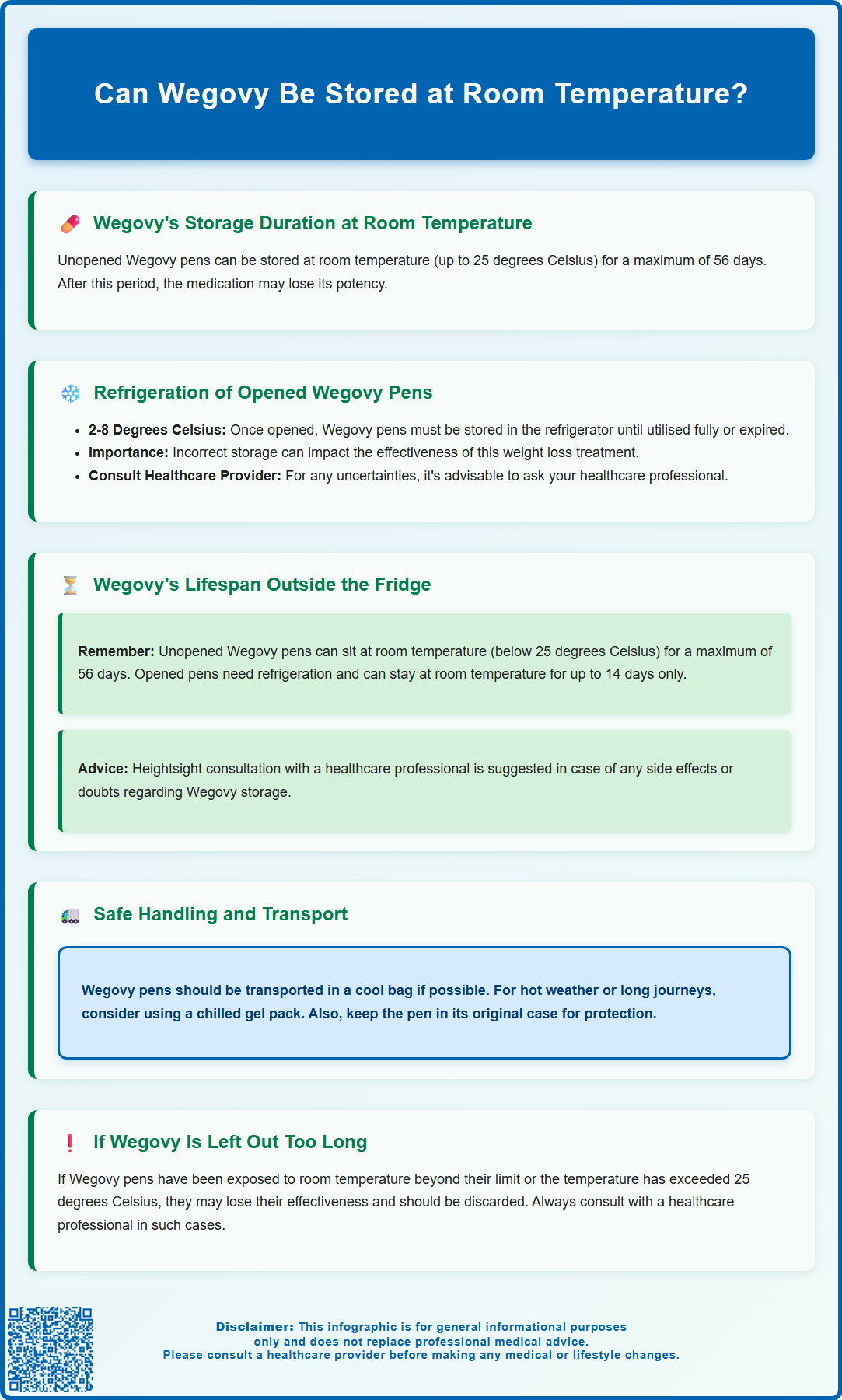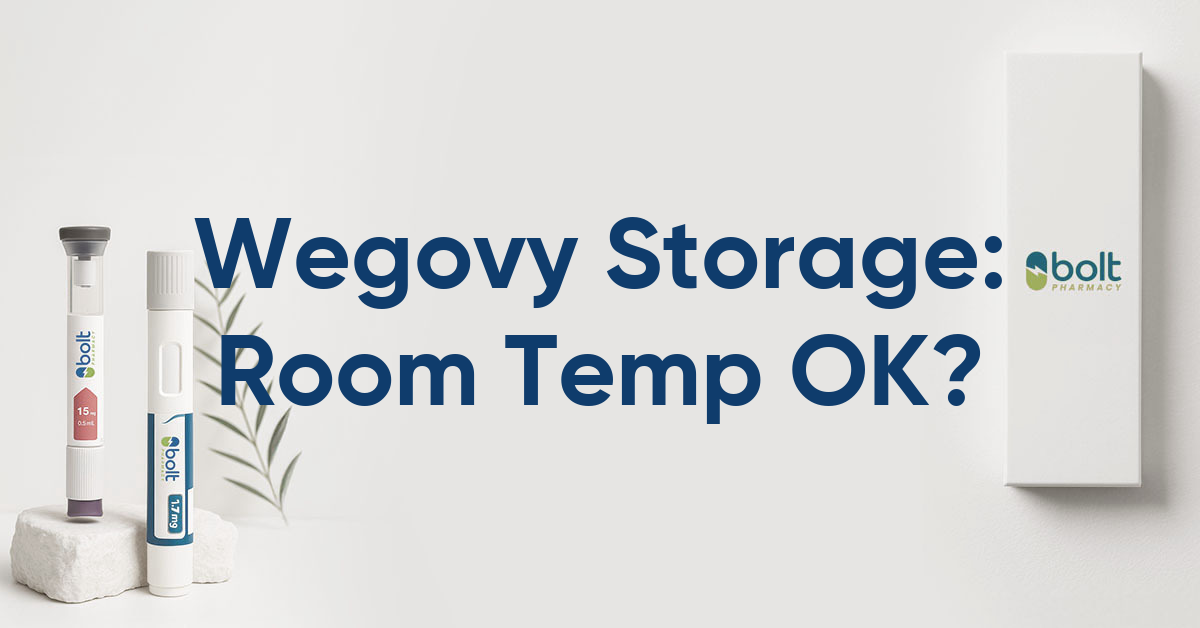Wegovy (semaglutide) is a GLP-1 receptor agonist licensed in the UK for weight management in adults with obesity or overweight with weight-related comorbidities. As a biological peptide medication, Wegovy requires specific storage conditions to maintain its stability and therapeutic efficacy. Understanding whether Wegovy can be stored at room temperature is essential for patients who travel, experience temporary refrigeration failures, or need flexibility in their medication routine. This article examines the MHRA-approved storage requirements, explains how long Wegovy can remain unrefrigerated, and provides practical guidance for maintaining medication effectiveness throughout treatment.
Summary: Wegovy can be stored at room temperature (up to 30°C) for up to 28 days when unopened, or up to 6 weeks once in use, though refrigeration between 2°C and 8°C remains the primary storage requirement.
- Wegovy is a GLP-1 receptor agonist requiring refrigeration (2°C to 8°C) as the primary storage method to maintain peptide stability
- Unopened pens may be kept at room temperature (not exceeding 30°C) for up to 28 days before use
- In-use pens can be stored at room temperature or refrigerated for up to 6 weeks from first use
- Exposure to temperatures above 30°C or freezing permanently damages the medication and reduces therapeutic efficacy
- Patients should inspect pens before each injection for cloudiness, discolouration, particles, or physical damage
- MHRA guidance requires disposal of pens exceeding storage time limits or exposed to improper temperatures
Table of Contents
Wegovy Storage Requirements: Refrigeration vs Room Temperature
Wegovy (semaglutide) is a glucagon-like peptide-1 (GLP-1) receptor agonist licensed in the UK for weight management in adults with obesity or overweight with weight-related comorbidities. The medication is available in different dose strengths (0.25 mg, 0.5 mg, 1 mg, 1.7 mg and 2.4 mg), with 2.4 mg being the maintenance dose. As a biological medicine containing a peptide molecule, Wegovy requires specific storage conditions to maintain its stability and therapeutic efficacy. The Medicines and Healthcare products Regulatory Agency (MHRA) approved Summary of Product Characteristics (SmPC) specifies that unused Wegovy pens must be stored in a refrigerator between 2°C and 8°C, kept in the outer carton to protect from light, and should not be frozen or stored near the freezer compartment.
Whilst refrigeration is the primary storage requirement, Wegovy can tolerate limited periods at room temperature under certain circumstances. Understanding these parameters is essential for patients who travel, experience temporary refrigeration failures, or need flexibility in their medication routine. According to the SmPC, unopened pens may be kept at temperatures up to 30°C for up to 28 days; returning to refrigeration within this timeframe is optional but not required. Patients should always follow the storage guidance provided with their medication to ensure its effectiveness throughout the treatment period.
The distinction between refrigerated and room temperature storage relates to the chemical stability of semaglutide. Peptide medications are susceptible to degradation when exposed to heat, which can reduce their potency and effectiveness. The refrigeration requirement ensures the medication maintains its full therapeutic activity throughout its shelf life. Once a Wegovy pen is in use, slightly different storage rules apply, offering patients greater flexibility during their treatment cycle. Healthcare professionals should ensure patients receive clear written and verbal instructions about proper storage at the point of prescribing to help maintain medication effectiveness.

How Long Can Wegovy Be Left Unrefrigerated?
According to the Summary of Product Characteristics approved by the MHRA, unused Wegovy pens may be stored at room temperature (not exceeding 30°C) for up to 28 days. This provision allows for reasonable flexibility when refrigeration is temporarily unavailable, such as during power cuts, travel, or when collecting prescriptions. However, once a pen has been stored at room temperature for any period, the cumulative time must not exceed 28 days, and the pen should ideally be returned to refrigerated storage between 2°C and 8°C when possible.
Once you begin using a Wegovy pen for your weekly injections, the storage requirements become more accommodating. An in-use pen may be stored either in the refrigerator (2°C to 8°C) or at room temperature (not exceeding 30°C) for up to 6 weeks. This extended room temperature tolerance for in-use pens recognises that patients need practical access to their medication and may not always have immediate refrigeration available. The pen cap should be kept on when not in use to protect the medication from light exposure. It is advisable to write the date of first use on the pen or carton to help track the 6-week in-use period.
It is crucial to track how long your Wegovy pen has been out of refrigeration. Patients should note the date when a pen is first removed from the fridge or when refrigeration is interrupted. Do not use the pen after the expiry date or after 6 weeks in use—whichever comes first. If the 28-day limit for unused pens or 6-week limit for in-use pens is exceeded, the medication should be discarded safely, even if doses remain. Using medication stored outside these parameters may result in reduced effectiveness for weight loss. NHS guidance recommends disposing of expired or improperly stored medicines through community pharmacy take-back schemes rather than household waste. Patients uncertain about their pen's storage history should consult their GP or pharmacist before administration.
What Happens If Wegovy Gets Too Warm?
Exposure to temperatures exceeding 30°C can compromise the structural integrity and pharmacological activity of semaglutide, the active ingredient in Wegovy. Peptide molecules are particularly vulnerable to heat-induced denaturation, a process where the three-dimensional protein structure unfolds or aggregates, rendering the medication less effective or potentially inactive. Whilst brief exposure to slightly elevated temperatures may not immediately destroy the medication, prolonged or extreme heat exposure progressively degrades the drug's potency.
Unfortunately, there is no reliable way for patients to visually determine whether Wegovy has been heat-damaged, as the solution may appear unchanged even when compromised. According to the Patient Information Leaflet (PIL), the medication should remain clear and colourless or almost colourless; however, maintaining this appearance does not guarantee full potency if storage guidelines have been violated. This uncertainty underscores the importance of adhering strictly to storage parameters. If your Wegovy pen has been exposed to temperatures above 30°C or if it has been frozen, the pen should not be used as potency and sterility cannot be assured. The medication should be returned to your pharmacy for safe disposal.
Using heat-compromised Wegovy may result in reduced therapeutic effect, meaning patients might experience diminished appetite suppression and less weight loss than expected. The primary concern with improperly stored medication is loss of efficacy. Patients who inadvertently use compromised medication and fail to achieve expected treatment outcomes may become discouraged or incorrectly conclude that Wegovy is ineffective for them. If you have concerns about medication storage or notice your weight loss has plateaued unexpectedly, discuss this with your prescribing clinician or pharmacist. They can assess whether storage issues might have contributed and determine appropriate next steps, which may include replacing the medication and reinforcing storage education.
Travelling with Wegovy: Practical Storage Tips
Travelling with Wegovy requires advance planning to maintain appropriate storage conditions throughout your journey. For short trips within the UK lasting less than 6 weeks, an in-use Wegovy pen can be kept at room temperature (below 30°C) without refrigeration, provided it remains protected from direct sunlight and extreme heat. Keep the pen in its original carton to shield it from light, and store it in the coolest part of your luggage. It is advisable to avoid placing Wegovy in checked baggage on flights due to the risk of freezing or overheating in cargo holds, where temperatures can fluctuate dramatically. According to UK Civil Aviation Authority guidance, medicines should ideally be carried in hand luggage.
For longer journeys or when travelling to warmer climates, a medical-grade cooling case or insulin travel wallet can help maintain stable temperatures. These products use evaporative cooling or ice packs to keep medications cool without freezing them. Avoid placing Wegovy directly against ice packs, as freezing will permanently damage the medication. When staying in hotels or accommodation, request refrigerator access or use the minibar fridge, ensuring the temperature setting won't freeze your medication. If refrigeration is unavailable, keep your pen in the coolest room location, away from windows and heating sources.
When passing through airport security, carry your Wegovy in hand luggage with your prescription or dispensing label. Consider bringing a letter from your GP confirming your need for the medication, particularly for international travel. The NHS advises checking specific airline policies before travel, as requirements may vary. For international travel, research the storage conditions you'll encounter at your destination and during transit. Some patients find it helpful to carry a small thermometer to monitor storage temperatures. The NHS recommends carrying sufficient medication for your trip plus extra in case of delays, and splitting supplies between carry-on bags if travelling with companions, reducing the risk of losing all medication if luggage is misplaced. Always check your travel insurance covers medication replacement if storage failures occur abroad.
Signs Your Wegovy Pen May Be Damaged
Before each injection, patients should inspect their Wegovy pen carefully for signs of damage or degradation that might indicate the medication is no longer safe or effective to use. According to the Patient Information Leaflet (PIL), the semaglutide solution should appear clear and colourless or almost colourless. Do not use the pen if the liquid appears cloudy, discoloured, or contains visible particles. These changes suggest the medication has degraded or become contaminated. Note that small air bubbles may be present in the solution and are not harmful.
Physical damage to the pen device itself also warrants caution. Inspect the pen body for cracks, leaks, or other structural damage that might have occurred during transport or handling. If the pen has been dropped from a significant height, the internal mechanism may be compromised even if external damage isn't visible. Check that the dose counter functions properly and that the pen cap fits securely. A damaged pen may deliver an incorrect dose, either too much or too little, affecting both treatment efficacy and safety. The needle should be attached immediately before injection and removed immediately afterwards; never store the pen with a needle attached, as this can lead to contamination, air bubbles, or medication leakage.
If you have any concerns about your Wegovy pen's integrity, do not use it. Contact your community pharmacist or GP practice for advice. They can assess whether the pen should be replaced and provide guidance on safe disposal. The MHRA encourages patients to report any suspected defective medicines through the Yellow Card scheme (yellowcard.mhra.gov.uk), which monitors medication quality and safety. Patients should never attempt to use a pen that has been frozen, even if subsequently thawed, as freezing irreversibly damages the medication's structure. When in doubt about storage history or pen condition, it is always safer to obtain a replacement rather than risk using compromised medication. Your healthcare team would rather replace a potentially damaged pen than have you receive suboptimal treatment.
Scientific References
Frequently Asked Questions
How long can an unopened Wegovy pen stay out of the fridge?
An unopened Wegovy pen can be stored at room temperature (up to 30°C) for up to 28 days according to MHRA-approved guidance. After this period, the pen should be discarded if not used, even if it appears normal.
Can I travel with Wegovy without refrigeration?
Yes, an in-use Wegovy pen can be kept at room temperature (below 30°C) for up to 6 weeks, making it suitable for travel. Keep the pen in its carton, away from direct sunlight and heat, and carry it in hand luggage rather than checked baggage.
What should I do if my Wegovy pen gets too hot?
If your Wegovy pen has been exposed to temperatures above 30°C or has been frozen, do not use it as the medication's potency cannot be assured. Return the pen to your pharmacy for safe disposal and obtain a replacement.
The health-related content published on this site is based on credible scientific sources and is periodically reviewed to ensure accuracy and relevance. Although we aim to reflect the most current medical knowledge, the material is meant for general education and awareness only.
The information on this site is not a substitute for professional medical advice. For any health concerns, please speak with a qualified medical professional. By using this information, you acknowledge responsibility for any decisions made and understand we are not liable for any consequences that may result.
Heading 1
Heading 2
Heading 3
Heading 4
Heading 5
Heading 6
Lorem ipsum dolor sit amet, consectetur adipiscing elit, sed do eiusmod tempor incididunt ut labore et dolore magna aliqua. Ut enim ad minim veniam, quis nostrud exercitation ullamco laboris nisi ut aliquip ex ea commodo consequat. Duis aute irure dolor in reprehenderit in voluptate velit esse cillum dolore eu fugiat nulla pariatur.
Block quote
Ordered list
- Item 1
- Item 2
- Item 3
Unordered list
- Item A
- Item B
- Item C
Bold text
Emphasis
Superscript
Subscript












